Stanford Reigns, Dartmouth Surprises in New Bloomberg MBA Rankings

For the second-consecutive year, the Stanford Graduate School of Business earned the top spot in Bloomberg Businessweek’s annual U.S. business school ranking. However, a new entry near the top of the ranking may be a slight surprise, with the Dartmouth College Tuck School of Business claiming the second spot.
Continue reading…The Best Energy Industry MBA Programs in the U.S.

With the current shift in global economics that coincides with climate change, business schools have seen the benefit of educating students toward a sustainable future. Whether through influencing public policy, investing wisely in carbon reduction technologies, or developing businesses that serve to adjust to global warming, MBA grads with a focus within the energy industry have limitless career prospects.
The Best Energy Industry MBA Programs in the U.S.

The University of California, Berkeley Haas School of Business‘ Bay Area location (a center for innovation in sustainability) make it a clean energy industry leader. With an interdisciplinary approach that combines engineering, public policy, and law, Berkeley Haas MBA students have access to such initiatives as Cleantech to Market (C2M). This partnership between grad students, industry professionals, and researchers offers an annual symposium presenting the newest trends in clean technologies.
In C2M, professionals in such arenas as energy generation, storage, grid technology, and water purification guide students through past solutions. Students integrate their curriculum into real world solutions with the help of these professionals and leading researchers.

Cornell’s SC Johnson Graduate School of Management also offers a wealth of opportunities in the development of sustainable solutions for MBAs with the school’s immersion program, the Center for Social Enterprise. After receiving a sizable endowment in 2002, researchers and business leaders formed the SC Johnson Professorship in Sustainable Global Enterprise. Recently ranked 2nd overall by Bloomberg Businessweek, the sustainability curriculum at Johnson has achieved wide acclaim.
In addition, Johnson offers an Environmental Finance and Impact Investing Fellowship. With projects sponsored by corporate and government entities, students receive opportunities to work with the World Bank, Barclays, and The Water Initiative to address pressing issues in development and the increasing demand to find alternative energy sources.

UNC’s Kenan Flagler Business School offers an MBA that they consider “unique among major business schools.” The program, which exhibits a marked emphasis upon ROI, focuses on the energy value chain, and the intersection of oil and gas usage, renewables, and petrochemicals.
This degree focuses primarily on training future leaders in corporate sectors, power generation, renewable energy, investing firms, and consulting firms specializing in energy.

MIT’s Sloan School of Management takes an exemplary role in leadership development for the sustainable energy industry. According to Sloan’s Sustainability Initiative, the school “empowers leaders to act so that humans and nature can thrive for generations to come.” With a mission that includes a sustainability certificate, partnerships with NGOs and government agencies, and an ongoing lecture series, MIT Sloan offers a strong foundation in cleantech development.
In a recent roundtable, experts in renewable energy supply chain discussed potential solutions. These include wind farms and solar power for underserved populations.
“When you’re inside a startup and talking to your colleagues all the time, it’s easy to lose sight of the big picture,” says Sandhya Murali, a recipient of the Sustainability Certificate. “Being able to talk with experts in the field and share ideas with veterans in the industry was extremely helpful.”
Murali, ’15, is the CEO of the Solstice Initiative, which provides solar energy to communities in every economic strata.

Finally, University of Pennsylvania’s Wharton School of Business is at the forefront of energy efficiency, offering an MBA major in Business, Energy, Environment and Sustainability. Combining a focus in tech, regulation, finance, and business modeling trends, this degree prepares MBAs for leadership roles in energy, clean-tech investment, energy banking, consulting, government, and the sustainable non-profit industry.
Courses include Energy Markets and Policy, Energy Finance, Environmental Management, Law and Policy, Social Impact Marketing and Energy Law.
In addition, there is a dual degree option for Wharton MBAs. In which, students can combine an MBA with a Master in Environmental Studies for career opportunities in energy management.
The Texas MBA Programs Guide: Houston vs. Dallas

If you’re looking to earn a Texas MBA, where should you go to school? Should you choose a top MBA program in Dallas or Houston? First, we need to take a look at the cities.
Living in Dallas vs. Houston
First, let’s take a look at the cost of living in Dallas vs. Houston. According to Numbeo, the world’s most extensive database containing user contributed data about cities, the overall cost of living is relatively similar: $4,242 in Houston compared to $4,000 in Dallas. Houston barely edges out Dallas with a slightly higher cost of living, and here’s how that’s broken down.
- Consumer Prices: 35 percent higher in Houston
- Rent Prices: 7.30 percent higher in Houston
- Restaurant Prices: 27 percent higher in Houston
- Groceries Cost: 95 percent higher in Houston
- Local Purchasing Power: 26 percent lower in Houston
Other things to consider when choosing between Dallas and Houston include:
- Industries
- Houston is known for being the oil capital and is an ideal location for jobs in the energy industry.
- Dallas, on the other hand, is known for real estate (Tramelle Crow is headquartered here), as well as hedge funds and asset management firms.
- Economic Development: According to Site Selection Magazine, Houston and Dallas are comparatively equal when it comes to economic development, ranking second and third respectively.
- Top Companies: Houston edges out Dallas for being home to more Fortune 500 companies. In fact, Houston is home to 27 top companies compared to 14 in Dallas. However, they rank second and third respectively.
However, according to Forbes, “while Houston and Dallas have decent amenities (and having better ones surely wouldn’t hurt), they aren’t places that offer a unique lifestyle brand, such as charming architecture or a cutting-edge arts scene.”
Texas MBA Programs
The next step is to compare the top three MBA programs in each city. In particular, we wanted to take a look at the tuition rates (two years), GMAT averages, and post-graduation salaries at each program in each city to get a well-rounded picture.
Overall, there are a few things to note right away.
- The top full-time MBA programs in both cities are ranked well. However, Houston programs tend to rank higher on major ranking sites such as The Economist and Bloomberg Businessweek.
- Houston tends to be more expensive regarding tuition ($93,052 vs. $69,191), but it also pays a higher salary ($110,000 vs. $92,000). This balances out with around a $25,000 difference in tuition and a $20,00 difference in post-graduation salary.
- Finally, GMAT averages for class profiles tend to be higher in Houston as well (688 vs. 660).
Here’s how it all breaks down per school.
Top 3 Houston MBA Programs
McCombs School of Business – University of Texas at Austin
The McCombs School of Business offers a full-time MBA, an Evening MBA, a Weekend MBA, and an Executive MBA program. And it’s considered one of the top business schools in the country, consistently ranking highly on various lists, including ranking 28 according to The Economist.
- Tuition Rates (two years): $91,000
- GMAT Averages: 703
- Post-Grad Salaries (Mean): $117,068
Rice University – Jones Graduate School of Business
The Jones Graduate School at Rice University offers a full-time MBA program, an MBA for Professionals (part-time), and an Executive MBA Program. The school’s full-time MBA program ranked 10th on the Bloomberg Businessweek list in 2017.
- Tuition Rates (two years): $116,000
- GMAT Averages: 711
- Post-Grad Salaries (Mean): $112,158
Mays Business School – Texas A&M University
The Mays Business School has both a full-time MBA program as well as a part-time Professional MBA program. In addition, the school offers an Executive MBA. In 2017, The full-time MBA program ranked 20th overall by Forbes, and 22nd overall by Bloomberg Businessweek.
- Tuition Rates (two years): $72,158
- GMAT Averages: 649
- Post-Grad Salaries (Mean): $103,299
Top 3 Dallas MBA Programs
Naveen Jindal School of Management – University of Texas at Dallas
The Naveen Jindal School offers a full-time MBA, part-time Professional MBA, Executive MBA, and Global Leadership Executive MBA program. The full-time MBA is well ranked according to the U.S. News & World Report, ranking 16th among public university programs in the U.S.
- Tuition Rates (two years): $27,603
- GMAT Averages: 678
- Post-Grad Salaries (Mean): $86,644
Cox School of Business – Southern Methodist University
The Cox School of Business at SMU offers a full-time MBA, Fast Track MBA, Professional MBA (part-time), and an Executive MBA program. Most recently, SMU Cox achieved its first Financial Times ranking at 91st.
- Tuition Rates (two years): $91,952
- GMAT Averages: 661
- Post-Grad Salaries (Mean): $96,587
Neeley School of Business – Texas Christian University
At the Neeley School of Business at TCU, MBA applicants can apply to the full-time MBA, Accelerated MBA, Professional MBA (part-time), Accelerated Professional MBA, or MBA for Energy Professionals program. The Economist ranked the Neeley School MBA ranks 61st overall on its most-recent ranking.
- Tuition Rates (two years): $88,020
- GMAT Averages: 640
- Post-Grad Salaries (Mean): $93,010
Dallas vs. Houston Breakdown in Charts
When breaking down the data between MBA programs in Dallas and Houston, here’s what it looks like:
Texas MBA Tuition
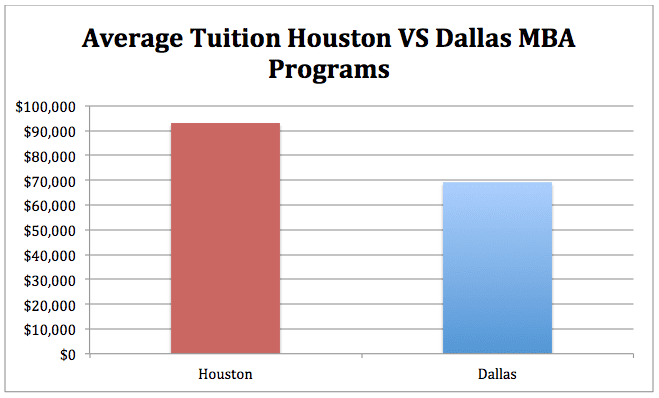
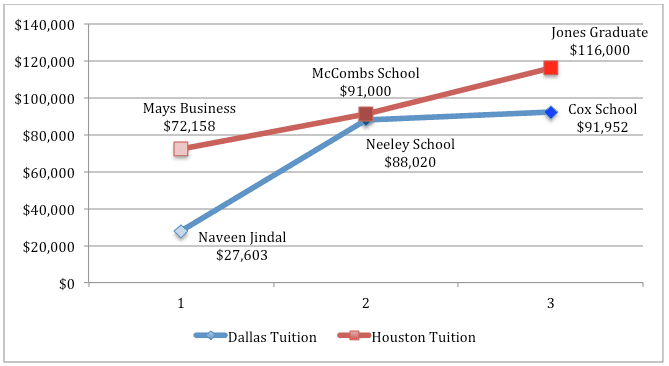
Texas MBA GMAT Averages
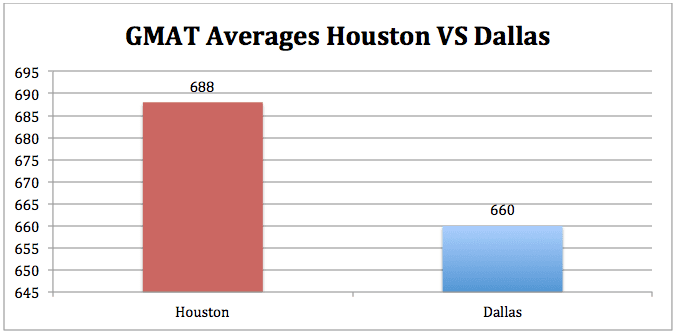
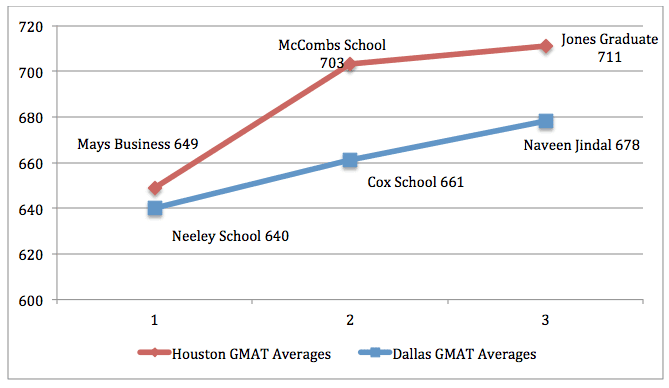
Texas MBA Post-Graduation Salaries
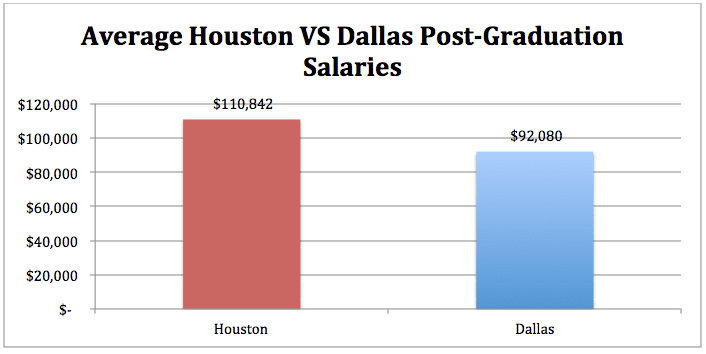
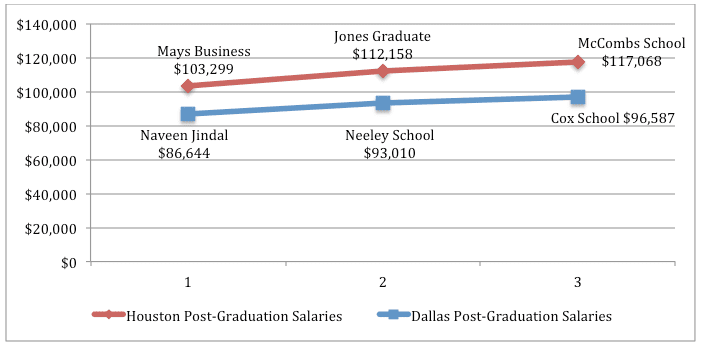
Bloomberg Businessweek Praises Rutgers, and More – New York News

Let’s explore some of the most interesting stories that have emerged from New York business schools this week.
Bloomberg Ranks Rutgers MBA No. 1 in the Northeast in Job Placement – Rutgers Business Blog
In its “Best Graduate Business Schools of 2017 ” survey, Bloomberg Businessweek ranked Rutgers Business School (Newark, New Brunswick) as the top business school in terms of job placement within the Northeastern United States,. coming in second overall in the United States. Andy Heller, RBS MBA ’11 and current senior associate director of payor and health system marketing at Boehringer Ingelheim sang Rutgers’ praises in terms of preparing him to succeed in the corporate world.
“That kind of experience has helped me each and every day since graduation. Having diverse perspectives on our team ensured that our solutions would be differentiated, yet relevant, and impactful,” Heller notes.
In addition, RBS topped its fellow Big Ten competitors when it came to return on investment, narrowly edging out the University of Iowa College of Business, and Northwestern University’s Kellogg School of Management. The latter of which offered a higher multi-year ROI for potential MBA students, but cost much more in terms of tuition.
Read more about Rutgers’ rankings and accolades here.
Are You a Good Fit for the Executive MBA/MS in Healthcare Leadership Program? – Johnson Business Feed
The Executive MBA/MS in Healthcare Leadership program at Cornell’s SC Johnson School of Management “integrates the general management curriculum of Johnson’s Executive MBA programs with the deep healthcare expertise of Weill Cornell Medicine’s Healthcare Policy and Research Department.” The joint program was developed to “reflect the future of healthcare” and help “sharpen and deepen the skill sets of healthcare professionals through business and healthcare leadership education,” according to the school.
“Today’s healthcare leaders need to be open to knowledge from different vantage points so they can advance progressive healthcare agendas, locally and nationally. Many healthcare leadership programs are exclusively for physicians. However, as we developed this new program, the physicians we spoke to expressed interest in an executive healthcare program that welcomed non-clinicians from different sectors of healthcare—not just practitioners.”
Take a look at the makeup of the Executive program below:
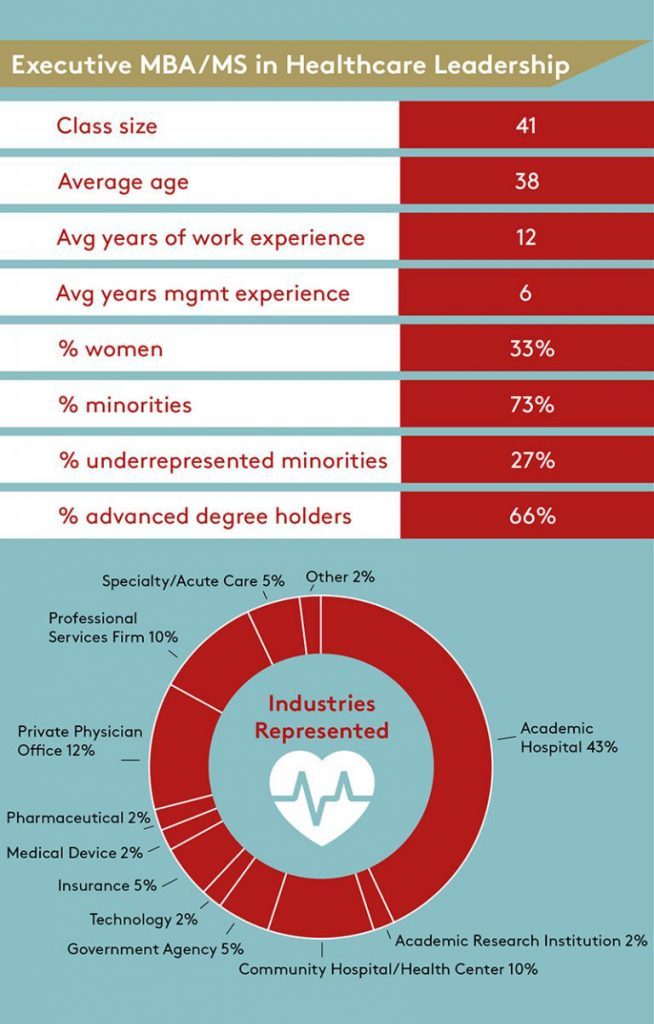
You can read here to learn more about what the program looks for in terms of applicants.
Rewiring Hidden Biases for Better Outcomes – Gabelli Connect
Fordham University’s Gabelli School of Business recently hosted a talk by Harvard professor of social ethics Mahzarin Banaji who unpacked the hidden biases of well-intentioned people—that is, “the beliefs that live in the subconscious and are formulated due to various exposures throughout one’s life.”
Banaji explains:
“A bias is nothing more than a tilting away from neutrality. There’s bias in the mind of the receiver and the applicant. We have to work with the very groups that are holding themselves back and educate those who are holding them back. We are capable of change by how many times we stretch those muscles.”
Learn more about Banaji’s take on unconscious biases here.
What Are The Most Valuable Toronto MBA Programs?

For prospective MBAs, looking at the price tag of earning a degree can be startling- and may even deter talented business leaders from pursuing an advanced education. The fear is certainly justified: an MBA from some of North America’s top business school can reach upwards of $100,000.
Yet, when considering the well-recorded increase that most professionals witness in their salary after earning an MBA, along with a greater likelihood of finding employment, the seemingly impossible cost of an MBA can seem more within reach.
Factors like the cost of a degree, salary increase after graduation and employment rate of graduates are all key numbers that must be considered together before one can determine the true cost of a degree. Below, we take a glance at these different numbers and round up the Toronto MBA programs that provide the best return on investment.
Ivey Business School – Western University Canada
The Ivey Business School at Western University Canada MBA program began in 1950, and has since established itself as one of the best offerings in the world. The business school’s rich legacy has been recognized again and again by the likes of Bloomberg, which touted its MBA as the 11th best international MBA program in 2017. Ivey, with its main teaching center on Western University’s campus in London, Ontario, offers a variety of MBA experiences, such as an full-time, Accelerated, and Executive MBA. The Tangerine Leadership Centre in Toronto’s downtown business district also offers EMBA courses through the Ivey Business School.
The full-time MBA at Ivey is a 12-month program that costs $88,250 to attend for domestic students and $101,500 USD for international applicants. According to the most recent Ivey employment report, about 91 percent of the 169 students in the Class of 2017 earned a job opportunity shortly after graduation, reporting an average salary of $103,560. More than one-third of the Class of 2017 also earned a singing bonus upon employment with a median value of $15,000. Signing bonuses for Ivey MBA grads ranged as high as $45,000 alone, proving that even with high price tag, the degree can immediately pay off.
Ivey Return on Investment (In USD)
| Ivey MBA Tuition | Median Signing Bonus | Median Annual Salary |
|---|---|---|
| $88,250 | $15,000 | $103,560 |
Schulich School of Business – York University
The Schulich School of Business at York University offers students a number of ways to pursue an advanced business education, from full-time, Executive, and International MBA programs as well as offering Master’s degrees in accounting, finance, business analytics, and more. The Schulich International MBA is the first of its kind in Canada, and the Kellogg-Schulich Executive MBA is North America’s first ever cross-border executive MBA degree. However, length of programs should be taken into consideration, since it will determine the time without a full-time income; an important distinction for students that are looking to enter the workforce as soon as possible. At 16-20 months, an MBA at Schulich will take slightly longer to earn than year-long programs like at Ivey.
Roughly 89 percent of graduates from Schulich’s MBA programs find a job within three months, earning an average base salary of $91,860 USD and an average singing bonus of $12,050. Full-time MBA students at Schulich will pay a tuition of $77,900 during the life of the degree, while part-time students pay $81,000. Meaning, grads typically earn about $10,000 more in their first year of employment than the entire cost of the program.
Schulich Return on Investment (In USD)
| Schulich MBA Tuition | Median Signing Bonus | Median Annual Salary |
|---|---|---|
| $77,900 | $12,050 | $91,860 |
Rotman School of Management – University of Toronto
The Rotman School of Management at the University of Toronto can boast of origins dating all the way back to 1901, when the university first established a diploma program in commerce. By 1972, the School of Business was an official part of the university, and hasn’t stopped growing since. Today, the Rotman School of Management has become universally recognized by the likes of Financial Times the and Bloomberg as one of the best business schools in the country. Located in downtown Toronto, Rotman offers a two-year, full-time MBA degree, but also more flexible options such as part-time morning and evening MBA programs, executive MBA, and an 18-month Global Executive MBA.
The two-year, full-time MBA tuition at Rotman comes with a price tag of $101,350 CAD ($74,999 USD). However, graduates—80 percent of whom typically find employment within three months after earning their degree—saw a median base salary of $85,000 and median signing bonus of $13,500. This salary increase seems to be typical of MBA graduates in Canada, so considerations of employment rate and program duration may be most important when evaluating Return on Investment for top programs in Canada.
Rotman Return on Investment (In USD)
| Rotman MBA Tuition | Median Signing Bonus | Median Annual Salary |
|---|---|---|
| $74,999 | $13,500 | $85,000 |
How the Penn State MBA Became a Bloomberg Businessweek Favorite

In one of the most remarkable leaps in the history of Bloomberg Businessweek’s annual U.S. business school ranking, the Penn State Smeal College of Business jumped from 37th to 25th in just a single year: the largest leap for any school in the ranking.
